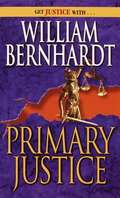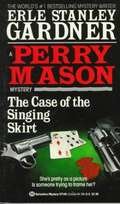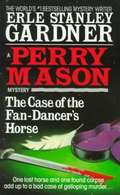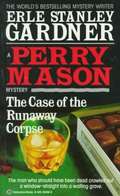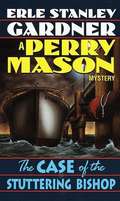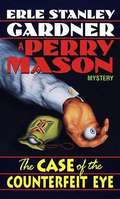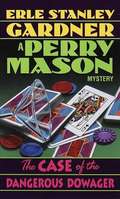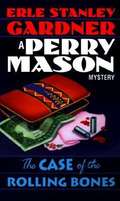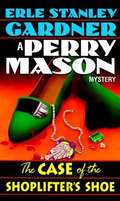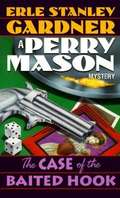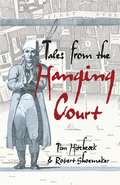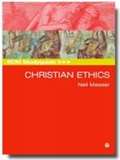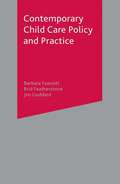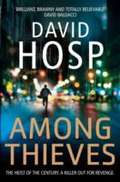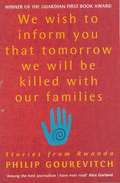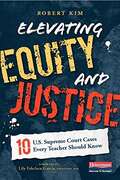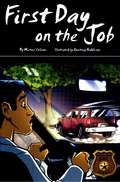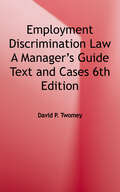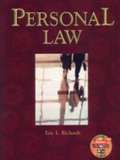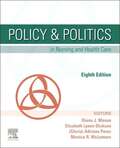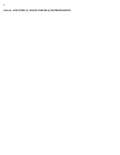- Table View
- List View
Primary Justice (Ben Kincaid Series #1)
by William BernhardtBen Kincaid wanted to be a lawyer to do the right thing. But when he takes a hot-shot spot in Tulsa's most prestigious law firm, Ben discovers that doing the right thing and representing his clients' interests can be mutually exclusive--in this explosive legal thriller that brings morality and temptation together in one dangerous motion.
The Case of the Singing Skirt
by Erle Stanley GardnerEllen Robb does more than just sing for her supper -- she also dances and sells cigarettes in a two-bit gambling parlor in a one-horse town. But when she hits a sour note with her scheming employer by refusing to help fleece a fat-cat customer in a crooked card game, she finds herself out of all three jobs. That's when she sings her song of woe to Perry Mason, who promises to turn her blues into greenbacks with the help of his crack team, Della Street and Paul Drake, and a hefty lawsuit. Things are humming along just fine -- until murder interrupts the merry melody of Mason's crafty legal maneuvers. When the vindictive wife of Ellen Robb's not-so-secret lover turns up shot to death, Mason is certain it's a frame-up -- and that his songbird client's belligerent boss is to blame. Until his own gun is found at the scene. The cocksure Mason will have to change his tune -- and do some quick thinking -- or else this case could be his swan song. The Perry Mason Novels Criminal lawyer and all-time #1 mystery author Erle Stanley Gardner wrote close to 150 novels that have sold 300 million copies worldwide. Today, the great Gardner tradition continues with many of his classics back in print, as well as brand-new additions to the ever-popular series starring the incomparable Perry Mason.
The Case of the Fan-dancer's Horse
by Erle Stanley GardnerIt all begins with the fan-dancer's "costume" - what there is of it.
The Case of the Moth-Eaten Mink
by Erle Stanley GardnerWhile dining at a restaurant after a grueling day, Perry Mason and his secretary, Della Street, find the proprietor angered by the sudden walkout of one of his waitresses. She leaves behind an old mink coat which ends up offering a number of clues to Perry in his next murder case.
The Case of the Runaway Corpse
by Erle Stanley GardnerPerry Mason defends a woman accused of poisoning her husband--even though witnesses saw the corpse climb out the motel window.
The Case of the Stuttering Bishop
by Erle Stanley GardnerMy secretary tells me you're Bishop William Mallory, of Sydney, Australia, and you want to see me about a manslaughter case.
The Case of the Grinning Gorilla
by Erle Stanley GardnerThe mysterious murder of an eccentric millionaire who studied gorillas as a hobby is unraveled by Perry Mason with the help of the diaries of a supposed suicide.
The Case of the Counterfeit Eye
by Erle Stanley GardnerWhen Peter Brunold shows up at Perry Mason's office, claiming one of his glass eyes has been stolen and a counterfeit substituted in its place, who could guess that it would lead to murder? But before you know it, the real authentic glass eye is found. Found in the hand of a dead man. And Brunold has an excellent motive for wanting him dead! He's in love with the dead man's wife. Was it suicide? Well, a gun is found on the floor of the room. But then a second gun is found under a blanket. Wait! There's a third gun in the dead man's shoulder holster. What's with all the guns? And that typed suicide note is starting to look suspicious. Yup, it's gotta be murder. And Peter Brunold is the one that all the evidence is pointing to. Can Perry Mason prove his innocence and at the same time point the finger at the guilty party? And can he do it, all the while confounding the new D.A.? You betcha! But why did he just go out and order six custom-made glass eyes?
The Case of the Dangerous Dowager
by Erle Stanley GardnerWhen Matilda Benson solicits the help of Perry Mason, her request seems simple enough: cruise to a gambling ship moored just beyond the twelve-mile limit and buy back the IOU's signed by Miss Benson's niece. But after Mason reaches the floating casino, he discovers problems aplenty--most notably the ship's owner with a bullet hole through his head. Strangely enough, Matilda and her niece are also on board that night...when someone tosses a gun over the railing. Does Perry Mason's client have something to hide? With the support of his trusty secretary, Della Street, and the ever-helpful Paul Drake, Mason dives into an ocean of menace.
The Case of the Rolling Bones
by Erle Stanley GardnerPerry Mason is almost stumped by the case of the Klondike millionaire imprisoned in Seattle and wanted for murdering the same man in both Alaska and California.
The Case of the Shoplifter's Shoe
by Erle Stanley GardnerAfter her well-to-do Aunt Sarah is caught shoplifting, Virginia Trent is convinced she needs to seek psychiatric help for kleptomania. So why does Virginia turn to legal eagle Perry Mason? Because a cache of valuable diamonds--left in Sarah's care--has suddenly vanished into thin air. Virginia thinks Sarah swiped the stones, but gem dealer Austin Cullens begs to differ. In fact, he's prepared to forgive and forget--until he is mysteriously murdered and Sarah is caught running from the crime scene. Now it appears the lady with the sticky fingers may have blood on her hands. ...
The Case of the Baited Hook
by Erle Stanley GardnerWho was that masked woman? That's the question plaguing the perpetually inquiring mind of Perry Mason. No one loves a good mystery more than Mason--but being asked to represent a client who's concealing her identity, not to mention the particulars of her case, has given even the legendary legal eagle a case of ruffled feathers.
The Case of the Beautiful Beggar
by Erle Stanley GardnerA beautiful debutante is shocked. Her beloved wealthy uncle is missing. Strange relatives are in charge of his fortune- and they're counting her out. Then a dead man surfaces, pointing his finger straight at her. Now she's desperate. To Perry Mason, however, it's all in a day's work. With clever secretary Della Street and street wise detective Paul Drake, he takes on THE CASE OF THE BEAUTIFUL BEGGAR.
Tales From the Hanging Court
by Tim Hitchcock Robert ShoemakerTales from the Hanging Court draws on published accounts of Old Bailey trials from 1674-1834, a rich seam of social, political and legal history. Through these compelling true stories of theft, murder, rape and blackmail, Hitchcock and Shoemaker capture the early history of the judicial system and the colourful, vibrant and sometimes scandalous world of pre-industrial London: 'This was a time when an orphan could live for a week by stealing a single handkerchief, but be hanged for less; when stocks and pillories were still in use, duels were still fought, and the medieval punishment of 'pressing' to death - spreadeagled on the ground and poled with heavy weights - was still on the statute books; when your jailer could invite you upstairs for a beer or leave you in an airless dungeon with no water on a whim; when you might be murdered in your bed for some linen or a silver tankard ' Time Out In its heyday the court was a soap opera of intrigue, sensation and murky goings on where authors such as Dickens and Defoe would go for inspiration. Thieves and murderers were often caught by members of the public and prosecutions brought by victims. Hitchcock and Shoemaker chart an increasingly sophisticated society taking crime and punishment away from the anarchy of the London mob to put it into a court where a judge and jury meted out justice. The authors paint a vivid picture of a flourishing city where market capitalism and Enlightenment thinking battled to impose order on the chaotic crime that accompanied Britain's economic miracle.
SCM Studyguide To Christian Ethics
by Neil MesserThe book covers the major areas of ethical theory and methodology that are key to any introductory course, including the use of the Bible in Christian ethics, natural law, conscience, various philosophical approaches to ethics and the influence of liberation theologies. The book also covers a wide range of topics in practical Christian ethics, all introduced by case studies, ranging from abortion, euthanasia, human genetic manipulation, health care rationing, divorce and remarriage, homosexuality, capital punishment, just war and "humanitarian intervention" GM crops, the environment, employment and globalisation.
Contemporary Child Care Policy and Practice
by Barbara Fawcett Brid Featherstone Jim GoddardThis important text will provide a critical analysis of contemporary developments in child care policy under New Labour and the resulting policy and practice implications. The authors will draw on sociological debates, the growing children's rights literature and wider developments within social policy in order to provide a thorough and balanced guide to contemporary developments in this rapidly changing field. Ideologies behind recent initiatives in a wide range of practice areas are explored, and the implementation of key developments are appraised. This will be primary reading for all students specializing in work with children and their families.
Among Thieves
by David HospOn the night of the St Patrick celebrations in 1990, some of the world's most famous and valuable paintings were stolen from Boston's Isabella Stewart Gardner Museum. They were never recovered, and there were no clues as to their whereabouts - that is until now. When Boston attorney Scott Finn takes on well-known thief, Devon Malley as a client, he gets much more than he bargained for. Not only is he asked to care for Devon's teenaged daughter, Sally, while Devon awaits bail, but his investigations into what he believed was a case of petty theft, lead him to the underworld of Boston's organized crime gangs, links with the IRA and the realization that he may be close to solving the mystery of the stolen paintings all those years ago. But an Irishman who, at nine years old, saw his entire family murdered before his eyes is determined to avenge their death. His commitment to the cause is frightening and unrelenting, and he will never give up until the job is finished
We Wish to Inform You That Tomorrow We Will Be Killed with Our Families: Stories From Rwanda
by Philip Gourevitch"There are few books, fiction or non-fiction, as compelling as Philip Gourevitch's account of the Rwandan genocide." Sebastian Junger, author of The Perfect Storm. "Like the greatest war reporters, Philip Gourevitch raises the human banner in hell's mouth.... This volume establishes him as the peer of Michael Herr, is no limit to what we may expect from him." Robert Stone. "Magnificent, terrifying.... Gourevitch's account is factual, unemotional - and utterly gut-wrenching... The great achievement of his book is that it allows us to imagine this unimaginable crime.... and those who stood by, human beings all." Irish Times.
On The Edge (Fountas & Pinnell Classroom, Guided Reading Grade 6)
by Sean Petrie Judit TondoraA DANGEROUS EXAGGERATION? Micah wants to impress Melody. So when she gets a chance to join Melody climbing the Jagged Giant, she eagerly joins, hiding the fact that she's never been rock climbing before. What if she goes too far—and fails? NIMAC-sourced textbook
Elevating Equity and Justice: Ten U. S. Supreme Court Cases Every Teacher Should Know
by Robert KimElevating Equity and Justice is just what the civic-minded activist in you is looking for-an accessible and engaging guide to connect your teaching to the times we live in, providing insight into ten United States Supreme Court cases that impact schools and teaching. Some of the cases will be familiar to you and some will not. Why these cases? They cover the landscape of both civil rights and civil liberties, exploring topics and situations teachers and administrators face every day. Plus they're interesting-they involve real problems of real people who are raising legal and policy issues thorny and weighty enough to have reached the highest court in the country. To read them is to take a mini course in the history of education in our nation and in the civil rights and civil liberties issues that educators and students encounter on a daily basis. <p><p> Robert Kim, an education policy expert and former civil rights lawyer, has spent much of the last two decades focused on the rights of students, as well as the legal rights and obligations of schools and educators. In Elevating Equity and Justice, Bob takes a deep dive into ten cases of historical impact, providing background and information on each as well as an explanation of why it is important to know them. He brings the source material to life without overwhelming you with "legalese" and dos and don'ts. <p><p> For each case, Bob provides a summary of the judicial opinion; some interesting history or perspective about the case, including more recent legal developments; the implications for educators and schools; classroom and community voices that provide insight from real teachers dealing with these topics; tips for how to be proactive; and a short list of resources to further your knowledge about the case or the topics covered in it. <p><p> Reading these ten cases certainly won't address every situation educators encounter. Chances are you'll be drawn to reflect on what these cases mean for your teaching practice or your school. How can they help you address the needs of a particular student? What civic lessons do they teach? What values do they impart? Elevating Equity and Justice helps educators consider the needs of all of their students and elevates the discussion, teaching, and practice of equity at school.
First Day on the Job (Fountas & Pinnell LLI Purple #Level S)
by Michael Sullivan<p>First Day on the Job by Michael Sullivan, illustrated by Courtney Huddleson. <p>Bad Day! Joe Sullivan has wanted to be a small-town police officer since he was in first grade, but no small-town police officer ever had a first day like this! <p>Text Elements <p> <li>Genre: Fiction, Realistic <li>Text Structure: Narrative <li>Text Features: embedded student report; heading shows the passage of time; Readers' Theater <li>Book 35 Level S <li>2270 Total Running Words</li>
Employment Discrimination Law: A Manager’s Guide Text and Cases
by David P. TwomeyA nationally known arbitrator in various employment-related disputes, Twomey offers insight from his on-the-job knowledge. This concise guide to employment discrimination and related laws raises awareness of issues in the workplace, enabling managers to provide the informed leadership necessary for a discrimination- and harassment-free working environment. <p><p>It includes updates on emerging employment and discrimination issues, such as Supreme Court rulings on sexual harassment and the ADA's narrowing scope of coverage. Employment Discrimination Law discusses factors important in determining when individuals are considered employees covered under the NLRA and when they are unprotected independent contractors. <p><p>Appendices offer excerpts from the EEOC's Guidance on Vicarious Employer Liability for Harassment by Supervisors and from the EEOC Guidance to Field Offices on ADA Charges.
Personal Law
by Eric L. RichardsInformative overview of personal law issues that are of practical importance in our lives.
Policy And Politics In Nursing And Health Care
by Diana J. Mason Adrianna Perez Monica R. McLemore Elizabeth Lynne DicksonLearn how to influence policy and become a leader in today's changing health care environment. Featuring analysis of cutting-edge healthcare issues and first-person insights, Policy & Politics in Nursing and Health Care, 8th Edition continues to be the leading text on nursing action and activism. Approximately 150 expert contributors present a wide range of topics in policies and politics, providing a more complete background than can be found in any other policy textbook on the market. This expanded 8th edition helps you develop a global understanding of nursing leadership and political activism, as well as the complex business and financial issues that drive many actions in the health system. Discussions include the latest updates on conflict management, health economics, lobbying, the use of media, and working with communities for change. With these innovative insights and strategies, you will be prepared to play a leadership role in the four spheres in which nurses are politically active: the workplace, government, professional organizations, and the community.
Legal And Ethical Issues For Health Professions
by Elsevier IncWith coverage of both legal and ethical issues, this text gives you the foundation to handle common health care challenges in everyday practice. Legal and Ethical Issues for Health Professions, 4th Edition includes practice cases specifically developed for key allied health programs along with enhanced pedagogical content. Additionally, it features a variety of exercises to help reinforce content from the book, as well as updated coverage of medical records, privacy, patient consent and abuse, the impact of inter professional team work, and key industry trends.
